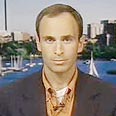
U.S. expert: Israeli media distort polls
How reliable are pre-election polls? Local media distort survey results, fail to present accurate picture, American professor says. Polls mishandled large number of undecided voters, Kenneth Goldstein charges
WASHINGTON – The margin of error of pre-election polls presented to the Israeli public is too large to show an accurate picture of what will unfold on Election Day, an American poll expert told Ynet.
The handling of the large number of undecided voters, which borders on mysterious, and media distortion of survey results make it difficult even for experts to predict what is in store, says Kenneth Goldstein, a political science professor at the University of Wisconsin.
Goldstein says that Kadima is expected to win, as all polls predict, but adds it is difficult to determine whether this will be a significant victory or a more marginal one, which will force the Olmert-led party to engage in difficult negotiations en route to forming a coalition.
Reports about Kadima going up or down by one, two, or three mandates are statistically insignificant and constitute "bad journalism," Goldstein told Ynet, and added the Israeli public receives reports that often lack basic facts, without an effort being made to explain the uncertainty of results.
"In almost all reports there's no explanation regarding how pollsters converted the results into the number of seats for each party," he said, adding the practice is opposed to the most basic standards of reporting acceptable in the U.S.
Surveys predicting Kadima will win 36 Knesset seats only indicates the party will win anywhere between 31 and 41 seats, he said. The American professor added that only 61 of the 85 polls published since the elections were called in November reveal the number of poll respondents. Goldstein charges that even those figures were obtained through efforts to elicit the information via alternative reports and not the original news reports.
Goldstein: U.S. pollsters not immune to mistakes
A further example of the problematic way of dealing with undecided voters, he said, can be found in a poll made public in March on a radio show.
"This sample of 513 Israeli adults, found that 32 percent – amounting to 38 mandates – said that they have yet to decide, or refused to say for whom they would vote," Goldstein said, but noted that the poll presented 119 seats (out of 120) as already decided.
Goldstein said this amounted to wildly assuming all those who have yet to decide will choose not to go to the polls at all, or that their vote will be divided among the parties in a similar way to those who already know how they will vote.
A further problem addressed by Goldstein is the fact most polls are undertaken in the evening, a method which he says increases the chances of missing many respondents.
However, despite the criticism, Goldstein also had consoling messages for Israeli pollsters and noted that American pollsters are also not immune to mistakes, pointing to the 200 presidential elections.
Goldstein added that he has been sitting in TV studios on election nights for 20 years but only had to predict who will win the presidential race, whereas his colleagues in Israel have to predict not only who won, but how Knesset seats will be divided among the various parties.










